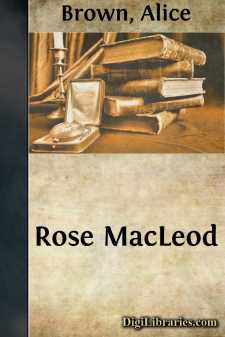Categories
- Antiques & Collectibles 13
- Architecture 36
- Art 48
- Bibles 22
- Biography & Autobiography 813
- Body, Mind & Spirit 142
- Business & Economics 28
- Children's Books 13
- Children's Fiction 10
- Computers 4
- Cooking 94
- Crafts & Hobbies 4
- Drama 346
- Education 46
- Family & Relationships 57
- Fiction 11828
- Games 19
- Gardening 17
- Health & Fitness 34
- History 1377
- House & Home 1
- Humor 147
- Juvenile Fiction 1873
- Juvenile Nonfiction 202
- Language Arts & Disciplines 88
- Law 16
- Literary Collections 686
- Literary Criticism 179
- Mathematics 13
- Medical 41
- Music 40
- Nature 179
- Non-Classifiable 1768
- Performing Arts 7
- Periodicals 1453
- Philosophy 64
- Photography 2
- Poetry 896
- Political Science 203
- Psychology 42
- Reference 154
- Religion 513
- Science 126
- Self-Help 84
- Social Science 81
- Sports & Recreation 34
- Study Aids 3
- Technology & Engineering 59
- Transportation 23
- Travel 463
- True Crime 29
The Prisoner
by: Alice Brown
Description:
Excerpt
There could not have been a more sympathetic moment for coming into the country town—or, more accurately, the inconsiderable city—of Addington than this clear twilight of a spring day. Anne and Lydia French with their stepfather, known in domestic pleasantry as the colonel, had hit upon a perfect combination of time and weather, and now they stood in a dazed silence, dense to the proffers of two hackmen with the urgency of twenty, and looked about them. That inquiring pause was as if they had expected to find, even at the bare, sand-encircled station, the imagined characteristics of the place they had so long visualised. The handsome elderly man, clean-shaven, close-clipped, and, at intervals when he recalled himself to a stand against discouragement, almost military in his bearing, was tired, but entrenched in a patient calm. The girls were profoundly moved in a way that looked like gratitude: perhaps, too, exalted as if, after reverses, they had reached a passionately desired goal. Anne was the elder sister, slender and sweet, grave with the protective fostering instinct of mothers in a maidenly hiding, ready to come at need. She wore her plain blue clothes as if unconscious of them and their incomplete response to the note of time. A woman would have detected that she trimmed her own hat, a flat, wide-brimmed straw with a formless bow and a feather worthy only in long service. A man would have cherished the memory of her thin rose-flushed face with the crisp touches of sedate inquiry about the eyes. "Do you want anything?" Anne's eyes were always asking clearly. "Let me get it for you." But even a man thus tenderly alive to her charm would have thought her older than she was, a sweet sisterly creature to be reverentially regarded.
Lydia was the product of a different mould. She was the woman, though a girl in years and look, not removed by chill timidities from woman's normal hopes, the clean animal in her curved mouth, the trick of parting her lips for a long breath because, for the gusto of life, the ordinary breath wouldn't always do, and showing most excellent teeth, the little square chin, dauntless in strength, the eyes dauntless, too, and hair all a brown gloss with high lights on it, very free about her forehead. She was not so tall as Anne, but graciously formed and plumper. Curiously, they did not seem racially unlike the colonel who, to their passionate loyalties, was "father" not a line removed. In the delicacy of his patrician type he might even have been "grandfather", for he looked older than he was, the worsted prey of circumstance. He had met trouble that would not be evaded, and if he might be said to have conquered, it was only from regarding it with a perplexed immobility, so puzzling was it in a world where honour, he thought, was absolutely defined and a social crime as inexplicable as it was rending.
And while the three wait to have their outlines thus inadequately sketched, the hackman waits, too, he of a more persistent hope than his fellows who have gone heavily rolling away to the stable, it being now six o'clock and this the last train.
Lydia was a young woman of fervid recognitions. She liked to take a day and stamp it for her own, to say of this, perhaps: "It was the ninth of April when we went to Addington, and it was a heavenly day. There was a clear sky and I could see Farvie's beautiful nose and chin against it and Anne's feather all out of curl. Dear Anne! dear Farvie! Everything smelled of dirt, good, honest dirt, not city sculch, and I heard a robin. Anne heard him, too. I saw her smile." But really what Anne plucked out of the moment was a blurred feeling of peace. The day was like a cool, soft cheek, the cheek one kisses with calm affection, knowing it will not be turned away. It was she who first became aware of Denny, the hackman, and said to him in her liquid voice that laid bonds of kind responsiveness:
"Do you know the old Blake house?"
Denny nodded. He was a soft, loosely made man with a stubby moustache picked out in red and a cheerfully dishevelled air of having been up all night.
"The folks moved out last week," said he. "You movin' in?"
"Yes," Lydia supplied, knowing her superior capacity over the other two, for meeting the average man. "We're moving in. Farvie, got the checks?"
Denny accepted the checks and, in a neighbourly fashion, helped the station master in selecting the trunks, no large task when there was but a drummer's case besides. He went about this meditatively, inwardly searching out the way of putting the question that should elicit the identity of his fares. There was a way, he knew. But they had seated themselves in the hack, and now explained that if he would take two trunks along the rest could come with the freight due at least by to-morrow; and he had driven them through the wide street bordered with elms and behind them what Addington knew as "house and grounds" before he thought of a way....








